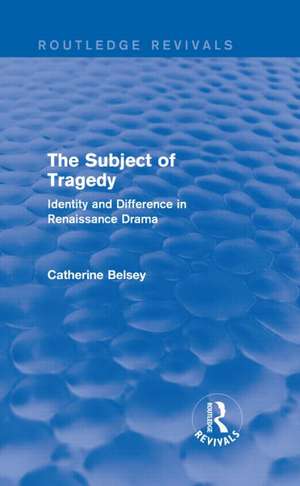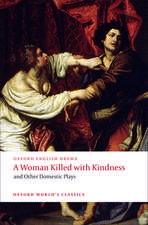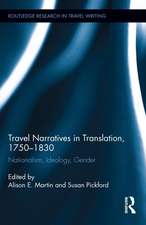The Subject of Tragedy (Routledge Revivals): Identity and Difference in Renaissance Drama: Routledge Revivals
Autor Catherine Belseyen Limba Engleză Hardback – 4 dec 2013
Din seria Routledge Revivals
- 9%
 Preț: 801.69 lei
Preț: 801.69 lei - 8%
 Preț: 432.15 lei
Preț: 432.15 lei -
 Preț: 153.81 lei
Preț: 153.81 lei -
 Preț: 230.80 lei
Preț: 230.80 lei -
 Preț: 294.72 lei
Preț: 294.72 lei -
 Preț: 258.72 lei
Preț: 258.72 lei - 9%
 Preț: 764.34 lei
Preț: 764.34 lei - 9%
 Preț: 903.41 lei
Preț: 903.41 lei -
 Preț: 296.10 lei
Preț: 296.10 lei -
 Preț: 342.36 lei
Preț: 342.36 lei - 9%
 Preț: 606.35 lei
Preț: 606.35 lei -
 Preț: 317.54 lei
Preț: 317.54 lei - 9%
 Preț: 764.28 lei
Preț: 764.28 lei -
 Preț: 257.00 lei
Preț: 257.00 lei -
 Preț: 238.40 lei
Preț: 238.40 lei -
 Preț: 259.47 lei
Preț: 259.47 lei - 9%
 Preț: 903.80 lei
Preț: 903.80 lei -
 Preț: 326.26 lei
Preț: 326.26 lei -
 Preț: 258.66 lei
Preț: 258.66 lei -
 Preț: 294.97 lei
Preț: 294.97 lei -
 Preț: 308.89 lei
Preț: 308.89 lei -
 Preț: 199.85 lei
Preț: 199.85 lei -
 Preț: 347.49 lei
Preț: 347.49 lei -
 Preț: 295.04 lei
Preț: 295.04 lei -
 Preț: 389.39 lei
Preț: 389.39 lei -
 Preț: 257.00 lei
Preț: 257.00 lei -
 Preț: 343.21 lei
Preț: 343.21 lei - 9%
 Preț: 640.90 lei
Preț: 640.90 lei - 9%
 Preț: 619.48 lei
Preț: 619.48 lei -
 Preț: 228.88 lei
Preț: 228.88 lei -
 Preț: 257.67 lei
Preț: 257.67 lei -
 Preț: 245.10 lei
Preț: 245.10 lei -
 Preț: 258.52 lei
Preț: 258.52 lei -
 Preț: 258.72 lei
Preț: 258.72 lei -
 Preț: 368.93 lei
Preț: 368.93 lei -
 Preț: 246.37 lei
Preț: 246.37 lei - 9%
 Preț: 832.07 lei
Preț: 832.07 lei -
 Preț: 258.66 lei
Preț: 258.66 lei -
 Preț: 286.98 lei
Preț: 286.98 lei - 18%
 Preț: 695.85 lei
Preț: 695.85 lei - 9%
 Preț: 934.94 lei
Preț: 934.94 lei - 5%
 Preț: 231.22 lei
Preț: 231.22 lei -
 Preț: 267.15 lei
Preț: 267.15 lei -
 Preț: 200.66 lei
Preț: 200.66 lei - 9%
 Preț: 638.61 lei
Preț: 638.61 lei -
 Preț: 259.68 lei
Preț: 259.68 lei - 9%
 Preț: 1038.45 lei
Preț: 1038.45 lei -
 Preț: 389.43 lei
Preț: 389.43 lei -
 Preț: 302.13 lei
Preț: 302.13 lei -
 Preț: 302.25 lei
Preț: 302.25 lei
Preț: 1163.81 lei
Preț vechi: 1419.29 lei
-18% Nou
Puncte Express: 1746
Preț estimativ în valută:
222.69€ • 233.17$ • 184.71£
222.69€ • 233.17$ • 184.71£
Carte tipărită la comandă
Livrare economică 10-24 aprilie
Preluare comenzi: 021 569.72.76
Specificații
ISBN-13: 9781138015340
ISBN-10: 1138015342
Pagini: 270
Dimensiuni: 138 x 216 x 16 mm
Greutate: 0.46 kg
Ediția:1
Editura: Taylor & Francis
Colecția Routledge
Seria Routledge Revivals
Locul publicării:Oxford, United Kingdom
ISBN-10: 1138015342
Pagini: 270
Dimensiuni: 138 x 216 x 16 mm
Greutate: 0.46 kg
Ediția:1
Editura: Taylor & Francis
Colecția Routledge
Seria Routledge Revivals
Locul publicării:Oxford, United Kingdom
Public țintă
Postgraduate and UndergraduateCuprins
Preface; 1. Introduction: Reading the Past; Part I: Man 2. Unity 3. Knowledge 4. Autonomy; Part II: Woman 5. Alice Arden’s crime 6. Silence and speech 7. Finding a place 8. Conclusion: changing the present; Notes; Bibliography; Index
Descriere
First published in 1985, The Subject of Tragedy takes the drama of the sixteenth and seventeenth centuries as the starting point for an analysis of the differential identities of man and woman. Catherine Belsey charts, in a range of fictional and non-fictional texts, the production in the Renaissance of a meaning for subjectivity that is identifiably modern. The subject of liberal humanism – self-determining, free origin of language, choice and action – is highlighted as the product of a specific period in which man was the subject to which woman was related.

















